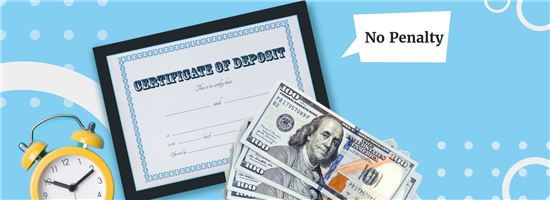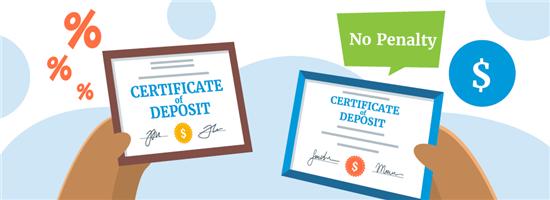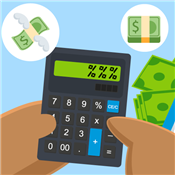Top No Penalty CD Rates for April 2025
Ad Disclosure: This article contains references to products from our partners. We may receive compensation if you apply or shop through links in our content. This compensation may impact how and where products appear on this site. You help support CreditDonkey by using our links.
Want a CD but without the commitment or early withdrawal penalties? Try No-Penalty CDs. See who has the top rates today.
 |
- Sallie Mae Bank:
14-Month No Penalty CD - 4.25% APY - OptimumBank:
5-Month No-Penalty CD - 4.20% APY - Ponce Bank:
4 Month No-Penalty CD - 4.15% APY - Mission Valley Bank:
3-Month No-Penalty CD - 4.15% APY - Technology Credit Union:
5-Month No Penalty CD - 4.00% APY - Sallie Mae Bank:
10-Month No Penalty CD - 3.90% APY - SkyOne Federal Credit Union:
12-Month No-Penalty CD - 3.90% APY - Freedom Bank:
12-Month No-Penalty CD - 3.75% APY - Freedom Bank:
9-Month No-Penalty CD - 3.65% APY - GreenState Credit Union:
12-Month No Penalty CD - 3.55% APY - Blue Federal Credit Union:
9-Month No Penalty CD - 3.50% APY - CIT Bank No Penalty CD - 3.50% APY
Have a chunk of money you want to keep safe? A no-penalty CD might be your perfect solution to lock in attractive returns, while maintaining the freedom to access your funds when you need them.
With anticipated Federal Reserve rate cuts in the next couple of months, secure a high APY now for guaranteed returns, regardless of market conditions.
Check out the best no-penalty CD rates and see whether this is the right investment for you.
Top CreditDonkey Picks:
- Best Short Term -
Ponce Bank: 4 Month No-Penalty CD - 4.15% APY - Best Long Term -
Sallie Mae Bank: 14-Month No Penalty CD - 4.25% APY - Most Popular -
Sallie Mae Bank: 10-Month No Penalty CD - 3.90% APY
14-Month No Penalty CD - 4.25% APY
- No penalty withdrawal after 30 days from opening
- FDIC insured
- No fees
- 24/7 online access to funds
5-Month No-Penalty CD - 4.20% APY
- No fees
- $1 minimum deposit
- 24/7 online access to funds
- FDIC insured
4 Month No-Penalty CD - 4.15% APY
- No penalty withdrawal after 30 days from opening
- FDIC insured
- No fees
- 24/7 online access to funds
3-Month No-Penalty CD - 4.15% APY
- No penalty withdrawal after 30 days from opening
- FDIC insured
- No fees
- 24/7 online access to funds
5-Month No Penalty CD - 4.00% APY
- No penalty withdrawal after 30 days from opening
- Deposits federally insured up to at least $250,000 by NCUA
- No fees
- 24/7 online access to funds
10-Month No Penalty CD - 3.90% APY
- No penalty withdrawal after 30 days from opening
- FDIC insured
- No fees
- 24/7 online access to funds
12-Month No-Penalty CD - 3.90% APY
- No penalty withdrawal after 30 days from opening
- Federally insured by NCUA
- No fees
- 24/7 online access to funds
12-Month No-Penalty CD - 3.75% APY
- No penalty withdrawal after 30 days from opening
- FDIC insured
- No fees
- 24/7 online access to funds
9-Month No-Penalty CD - 3.65% APY
- No penalty withdrawal after 30 days from opening
- FDIC insured
- No fees
- 24/7 online access to funds
12-Month No Penalty CD - 3.55% APY
- No penalty withdrawal after 30 days from opening
- NCUA insured
- No fees
- 24/7 online access to funds
CIT Bank No Penalty CD - 3.50% APY
- 3.50% APY
- Option to withdraw full balance and interest after 7 days of CD funding date
- $1,000 minimum to open an account
- 11 months
- No monthly maintenance fee
- Member FDIC
Quick No-Penalty CD FAQs
- Can I really withdraw with no penalty?
Yes. With No-Penalty CDs, you can withdraw early without any early withdrawal fees. However, most banks have an initial lock-in period where you cannot withdraw. Usually, this is 6 days after opening and funding your account (per federal guidelines). But some banks may be a little longer.
- Can I lose money in a No-Penalty CD?
The only way you'll lose money in a No-Penalty CD is if you withdraw funds within the non-withdrawal period (usually 6 days, but some banks may have their own rules). You'll face an early withdrawal penalty if you do so.
- What's better: a No-Penalty CD or a high yield savings account?
You can find both accounts with competitive APYs. However, the advantage of a CD is that you secure the rate, regardless of market fluctuations. And a further benefit of a No-Penalty CD is that you can take out your funds early if you need them, making it a flexible alternative to a savings accounts.
But with a high-yield savings account, you can continuously deposit and withdraw funds as needed. So it's better for those who are still actively saving and need frequent access to their funds. Whereas a No-Penalty CD is better for who already have a chunk of money saved they want to keep safe.
- What's the biggest downside of putting my money in a No-Penalty CD?
There are really very few downsides to No-Penalty CDs since you don't need to worry about early withdrawal fees. The only potential downside is that in exchange for the flexibility, some banks may not offer as high rates as regular CDs.
- Do I keep my interest earnings if I withdraw early?
Yep! You'll keep all the interest you've earned when you withdraw early.
- Can I withdraw just some of my funds?
No. Usually you cannot do a partial withdrawal. If you need to withdraw early, you'll have to withdraw your full amount and close the account.
Keep reading to learn more about No-Penalty CDs.
Technically, yes you can withdraw your CD before maturity but there may be penalties. If you get a no-penalty CD, you can withdraw early without fees. If you're really not sure what's best, you can also consider more flexible options like high-yield savings accounts.
Why Open a No-Penalty CD
No-Penalty CDs are ideal if you want to:
- Preserve capital and earn steady returns without commitment
- Retain flexibility to withdraw your funds when a better savings product is available
- Save for a big purchase with uncertain timeline
- Store your emergency fund in an account with more reliable returns
Here's how it compares with other account types:
| No-Penalty CDs | Regular CDs | High-Yield Savings | Treasury Bills | |
|---|---|---|---|---|
| For short-term goals | ✓ | x | ✓ | ✓ |
| For long-term goals | ✓ | ✓ | x | x |
| Locked-in rates | ✓ | ✓ | x | x |
| No early withdrawal fees | ✓ | x | ✓ | May have commission fees |
| Easily move your funds to accounts with better rates | ✓ | x | ✓ | x |
| Safe & secure investment | ✓ | ✓ | ✓ | ✓ |
| Suitable for emergency funds | ✓ | x | ✓ | ✓ |
| Partial withdrawals | x | x | ✓ | x |
Here's a smart solution: use CD laddering. This is when you spread your money across multiple CDs with varying maturities. This way, you'll have money available to you at regular intervals.
And if you need money before maturity, you only need to close one account and the rest of your money can safely stay in their CDs. This would work best with no-penalty CDs since you can withdraw early with no fees.
How Much Does a No-Penalty CD Pay?
If you had $50,000 in a no-penalty CD with 5% APY, you would earn $2,500 in one year. To earn the most interest, you want to get the highest APY available on a no-penalty CD.
Here's a table to illustrate how much you can earn on a no-penalty CD with different APY and deposit amounts, in one year.
| $10,000 | $25,000 | $50,000 | |
|---|---|---|---|
| 0.00% | $10,000 | $25,000 | $50,000 |
| 0.50% | $10,050 | $25,125 | $50,250 |
| 1.00% | $10,100 | $25,250 | $50,500 |
| 1.50% | $10,150 | $25,375 | $50,750 |
| 2.00% | $10,200 | $25,500 | $51,000 |
| 2.50% | $10,250 | $25,625 | $51,250 |
| 3.00% | $10,300 | $25,750 | $51,500 |
| 3.50% | $10,350 | $25,875 | $51,750 |
| 4.00% | $10,400 | $26,000 | $52,000 |
| 4.50% | $10,450 | $26,125 | $52,250 |
| 5.00% | $10,500 | $26,250 | $52,500 |
| 5.50% | $10,550 | $26,375 | $52,750 |
Willing to Trade Flexibility for Better APYs? Try Regular CDs
 |
No-penalty CDs are suitable for those who might need access to their funds before the term ends. This could be for unexpected expenses, emergencies, and such.
It's also a good option if you want your funds to be on standby for better investment opportunities.
Although Regular CDs do not have this flexibility and will incur early withdrawal fees, you WILL have more rates and terms to choose from. Some might have better rates than no-penalty CDs in exchange for the commitment.
- mph.bank:
60-Month Callable CD - 4.32% APY - Freedom Bank:
6-Month High-Yield CD - 4.30% APY - Western Alliance Bank:
6-Month High-Yield CD - 4.30% APY - Sallie Mae Bank:
27-Month High-Yield CD - 4.25% APY - Ponce Bank:
4-Month High-Yield CD - 4.25% APY - Dayspring Bank:
4-Month High-Yield CD - 4.25% APY - Bank Of Utah:
6-Month High-Yield CD - 4.25% APY - UNCLE Credit Union:
36-Month Callable CD - 4.20% APY - SkyOne Federal Credit Union:
48-Month Callable CD - 4.15% APY - Generations Bank:
6-Month High-Yield CD - 4.15% APY
What's the Catch with No-Penalty CDs?
After opening your no-penalty CD, most banks won't allow you to withdraw your money a week or two. After this initial period, you can withdraw early with no charges.
Also, when you do withdraw your no-penalty CD, you usually have to take out the whole amount. Most banks do not allow partial withdrawals. But some might let you withdraw only your interest earnings.
Yes, your deposits in no-penalty CDs are federally insured for up to $250,000 by the FDIC or the NCUA. You can rest assured that your money is protected even if your bank or credit union fails.
Pros and Cons of a No-Penalty CD
Pros:
- No early withdrawal penalties
If you need your money before the end of the term, you can withdraw without penalties. This makes it a good option if you want a CD, but not the commitment. - More flexibility
If APYs rise and you see another account with a higher rate, you can easily take out your money and invest it elsewhere. You don't need to miss out on better opportunities. - Secure and guaranteed returns
Your deposits are federally insured for up to $250,000. Your rate is also fixed during the term so you don't have to worry about interest rates changing.
12-Month No-Penalty CD - 3.90% APY
- $1 minimum deposit
- 24/7 online access
- Federally insured by NCUA
Cons:
- Limited availability and term options
Unfortunately, no-penalty CDs are not offered by all banks. And when they are available, you usually have limited options for term length. - No additional deposits and partial withdrawals
Unlike savings accounts, you typically cannot add more deposits to your no-penalty CD once it's opened. You usually can't make partial withdrawals either.
CIT Bank Platinum Savings - 4.10% APY
- 4.10% APY with a balance of $5,000 or more
- 0.25% APY with a balance of less than $5,000
- $100 minimum opening deposit
- No monthly maintenance fee
- Member FDIC
How to Choose the Best No-Penalty CD
 |
If you're set on getting a no-penalty CD, here are some questions you can ask yourself while looking for one:
What is the APY?
You want the highest rates to earn bigger returns. Usually, smaller online banks and credit unions will offer the best rates. So don't be afraid to look at these options (they're just as safe as big banks as long as they're a member of FDIC or NCUA).
What is the term?
You want to get a no-penalty CD with a term that fits your financial goals. Although you have the option to withdraw flexibly, you should still get a no-penalty CD that can benefit you during a specific timeline.
When can I withdraw?
Usually, you can withdraw your no-penalty CD a week or two after funding the account. But this is at the discretion of the bank or credit union.
Some may allow you to close your account six days after funding it[1]. It's best to check with your bank or credit union to confirm when you can withdraw your no-penalty CD.
What is the minimum deposit?
Some no-penalty CDs may have minimum opening requirements. This could range from as low as $1 to over $2,500. So, make sure to choose a no-penalty CD that fits your budget.
| APY | Minimum Deposit | ||
|---|---|---|---|
| Sallie Mae Bank: 14-Month No Penalty CD | 4.25% | $1 | Learn More |
| OptimumBank: 5-Month No-Penalty CD | 4.20% | $1 | Learn More |
| Mission Valley Bank: 3-Month No-Penalty CD | 4.15% | $1 | Learn More |
| Technology Credit Union: 5-Month No Penalty CD | 4.00% | $1 | Learn More |
| Sallie Mae Bank: 10-Month No Penalty CD | 3.90% | $1 | Learn More |
| SkyOne Federal Credit Union: 12-Month No-Penalty CD | 3.90% | $1 | Learn More |
| Freedom Bank: 12-Month No-Penalty CD | 3.75% | $1 | Learn More |
| Freedom Bank: 9-Month No-Penalty CD | 3.65% | $1 | Learn More |
| GreenState Credit Union: 12-Month No Penalty CD | 3.55% | $1 | Learn More |
| Blue Federal Credit Union: 9-Month No Penalty CD | 3.50% | $1 | Learn More |
| CIT Bank No Penalty CD | 3.50% | $1,000 | Learn More |
TIP: If stability is your goal, a Gold IRA could be your answer. Learn how adding gold to your portfolio can offer peace of mind.
Free Gold IRA Web Conference
- Free 1-on-1 web conference designed by an on-staff, Harvard-trained economist
- Lifetime support even after your purchase
Free Gold IRA Kit
- Up to $10,000 in free silver for eligible customers
- Highest buyback price, guaranteed
- Endorsed by Sean Hannity and Chuck Norris
Free Information Kit
- Free "insider" info on gold & silver
- 1-on-1 care with a dedicated specialist
- Endorsed by Ben Shapiro and Ron Paul
Alternatives to No-Penalty CDs
Although no-penalty CDs are flexible, they may not be the best option for you. Here are other options you can consider:
High-yield savings accounts
An online high-yield savings account will let you add more deposits or withdraw money when you need to. But the rates are not fixed. Depending on market conditions, that could work in your favor, or not.
- Axos ONE:
Earn up to 4.66% APY - Live Oak Bank:
High Yield Savings Account - 4.35% APY - American First Credit Union:
Money Market Deposit Account - 4.30% APY - Prism Bank:
Money Market Deposit Account - 4.29% APY - Generations Bank:
Money Market Deposit Account - 4.29% APY - Mission Valley Bank:
High Yield Savings Account - 4.27% APY - DR Bank:
High-Yield Savings Account - 4.25% APY - Harborstone Credit Union:
Money Market Deposit Account - 4.25% APY
Short term CDs
You can build a CD ladder with short-term CDs to address your liquidity needs. The CDs will mature in shorter intervals which gives you some flexibility with your funds. Some might also have better rates than no-penalty CDs.
- Freedom Bank:
6-Month High-Yield CD - 4.30% APY - Dayspring Bank:
1-Month High-Yield CD - 4.30% APY - Bank Of Utah:
3-Month High-Yield CD - 4.30% APY - Western Alliance Bank:
6-Month High-Yield CD - 4.30% APY - Always.bank:
3-Month High-Yield CD - 4.25% APY - Ponce Bank:
3-Month High-Yield CD - 4.25% APY - Mission Valley Bank:
1-Month High-Yield CD - 4.15% APY - SkyOne Federal Credit Union:
3-Month High-Yield CD - 4.15% APY - Generations Bank:
6-Month High-Yield CD - 4.15% APY - United Republic Bank:
1-Month High-Yield CD - 4.15% APY
What the Experts Say
CreditDonkey asked a panel of industry experts to answer readers' most pressing questions. Here's what they said:
Bottom Line
No-penalty CDs might be a good alternative to regular CDs if you want to avoid early withdrawal penalties. But they are quite rare and may have limited term options.
When in doubt, step back and assess what will be a good investment for you. Ultimately, a no-penalty CD must play well with your financial goals.
References
- ^ eCFR. Truth in Savings (Regulation DD), Retrieved 08/15/2024
Write to Rue Atanacio at feedback@creditdonkey.com. Follow us on Twitter and Facebook for our latest posts.
Note: This website is made possible through financial relationships with some of the products and services mentioned on this site. We may receive compensation if you shop through links in our content. You do not have to use our links, but you help support CreditDonkey if you do.
|
|
| ||||||
|
|
|


















